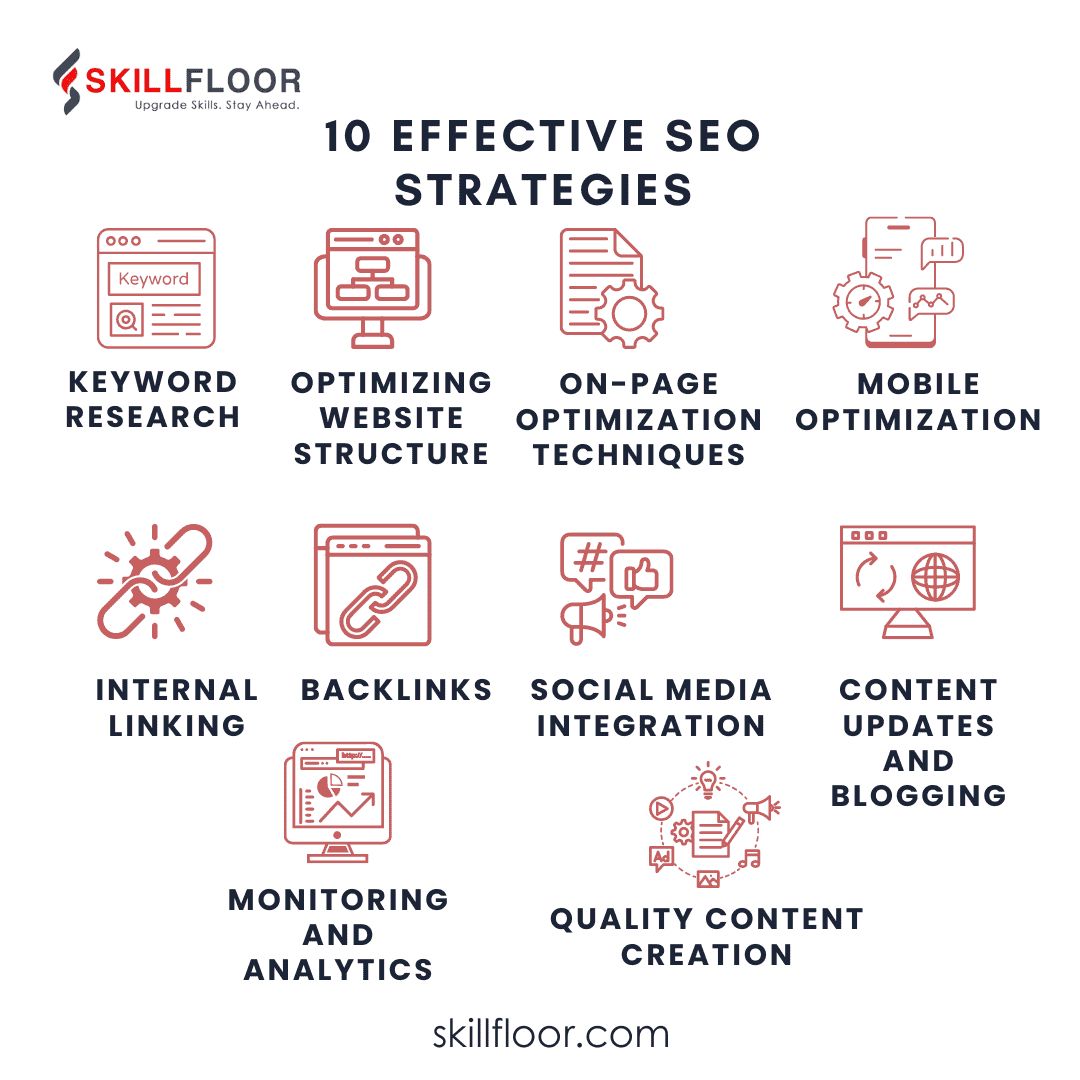10 Effective SEO Strategies for Your Business
Discover 10 effective SEO strategies to boost your business's online visibility, drive traffic, and increase conversions. Start optimizing today for better results.

Promoting business success needs search engine optimization (SEO), which makes sure that potential clients can quickly find your offerings online. You may attract additional traffic to your website, increase your online presence, and raise the chance that site visitors will become paying customers by making your website more visible in search engine results. You need to grasp 10 effective SEO strategies for your businesses if you want to improve their digital influence. This extensive manual includes SEO strategies, including content marketing strategies, on-page SEO strategies, off-page SEO strategies, and search engine optimization advice. By using these techniques, you may improve the way your web pages function in search results, draw visitors in with insightful content, and develop trusted backlinks from other websites. Using all available SEO techniques increases not only the usability of your website but also its growth and online presence, increasing your company's visibility and competition in the world of technology.

Keyword Research
Targeted keyword research is essential because it allows you to understand what customers are searching for. Knowing these keywords will help you create content that appeals to their needs and interests. This raises the likelihood that the correct people will visit your website and interact with your content. Performing thorough keyword research also helps you identify areas of competition and places you in a position to differentiate yourself. Said another way, it's about building a relationship with your audience by speaking their language and answering their particular concerns.
Here are some simple points on tools and techniques for finding the right keywords:
-
Google Keyword Planner: Find keywords that are relevant to your company and check their competition and search traffic with this free tool.
-
SEMrush: It is useful for general SEO analysis as well as identifying the keywords that your rivals are using.
-
Ahrefs: Useful for suggesting keywords and determining the volume of searches for each term.
-
Ubersuggest: is a free tool that offers trending keywords, search traffic, and related information.
-
Answer to the Public: Excellent for identifying long-tail keywords and learning what queries people have on a subject.
Optimizing Website Structure
A well-structured website is essential for SEO because it makes your website easier for search engines to understand and raises your ranks. Organize the content into various groups, working your way from general to niche subjects, to improve SEO. Make sure you include internal links between similar pages to keep users interested and show search engines how your content relates to one another. Simplify your navigation and think about including a sitemap to make it easier for search engines to index your website. Using this strategy will improve the usability and search engine optimization of your website.
Quality Content Creation
High-quality, relevant content is essential for SEO since it brings search engines and users in. Understand what your audience wants and meet those needs directly to ensure that your content is in line with user objectives and SEO goals. To help search engines connect your content with the right audience, use keywords naturally. Maintaining up-to-date content will increase visitors and establish the authority of your website. Users and search engines both gain from this strategy.
On-Page Optimization Techniques
The goal of on-page SEO is to improve the features of your website so that search engines are better able to understand and rank your content.
Important on-page SEO strategies are reduced to these key points:
-
Meta Tags: Use brief descriptions to optimize the content of your sites for search engines and to control how your pages appear in search results.
-
Headings: To organize content and make it easier for customers and search engines to understand the major subjects, use clear headings (such as H1, H2, and H3).
-
URLs: To make the page more understandable for customers and search engines, create URLs that contain relevant search terms. Verify the readability and simplicity of URLs.
Mobile Optimization
Since many people access the internet through mobile devices, websites must be optimized for mobile devices. An optimized mobile website improves the user experience by enabling users to explore, read, and engage with your information from any location. This flexibility affects SEO rankings as well as customer happiness because search engines like Google give preference to mobile-friendly websites in their search results. Making sure your website is mobile-friendly can help you reach a larger audience and increase the likelihood that it will succeed online.
Utilizing Internal Linking
Internal linking is essential for SEO since it tells search engines about the structure of your website and indicates which pages are important. Good internal linking drives users to read more of your material, which increases their stay on your site and increases engagement, all of which improve search engine rankings. Make sure all links are important, make use of informative anchor language, and help with logical navigation. When done well, internal linking makes your website more valuable to users and easier to navigate, which improves both the user experience and SEO performance.
Gaining Backlinks
Because backlinks function as recommendations from other websites, they are essential for SEO because they tell search engines that your content is reliable and significant. Focus on producing educational and interesting content that people will want to share if you want to acquire high-quality backlinks. You can also work with influencers in your field, join online groups related to your niche, and approach respectable websites about guest writing opportunities. These tactics expand the exposure and reach of your website while also boosting its authority.
Social Media Integration
Social networking increases your content's visibility and reach, which has an impact on SEO. Links you post on social media sites drive more visitors to your website when fans and followers click through. Search engines interpret this increased traffic as useful and relevant material, which could raise your rankings. Furthermore, because social media creates buzz about your material online, search engines will index it more quickly.
Regular Content Updates and Blogging
Consistent blogging and regular content updates keep your website current and relevant, which is good for SEO. Regular updates let search engines know that your website is active, which encourages more frequent crawling and could lead to higher rankings. In addition, there are more opportunities to include keywords and subjects that draw visitors when new content is regularly added. This ongoing interaction keeps your audience engaged and draws in new ones, increasing the authority and visibility of your website.
Monitoring and Analytics
Understanding SEO's efficacy requires tracking and evaluating its growth. Insights concerning traffic, rankings, and user activity are available through tools like SEMrush and Google Analytics. These tools track how users interact with your website to help you find techniques that work and areas that could be used better. By constantly monitoring these indicators, you may make necessary adjustments to your SEO strategy to better achieve your objectives and improve site performance.
A variety of techniques are included in effective SEO, such as conducting keyword research, organizing websites, producing high-quality content, and improving on-page components. Regular updates and social media integration are also essential. By increasing user interaction and site visibility, these techniques help your website become more visible and authoritative in search engine results.



























































